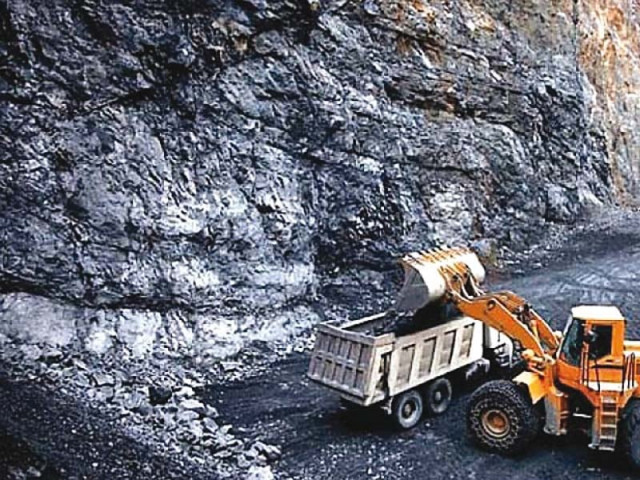Thar coal project enters construction phase
CEO hopes project will be completed well ahead of schedule

PHOTO: FILE
Pakistan has long been suffering from hours-long electricity outages as it banks on a poor energy mix that leads to heavy imports of fuel oil. Consequently, the consumers are burdened with higher electricity tariffs and the government is compelled to provide over Rs100 billion in subsidy despite a sharp fall in global crude prices.
Thar coal project: ‘Reservoir being built without official approval’
The poor energy mix has also caused accumulation of a huge circular debt, which has enveloped the entire energy chain. At present, oil-based energy has a share of 61% in the energy mix.
In the Thar desert, the world’s largest coal reserves are buried. Studies suggest the region has 175 billion tons of coal deposits out of a total of 186 billion tons in Pakistan.
The Thar coal reserves beat the oil reserves held by Saudi Arabia and Iran. When converted into gas, the coal deposits are equal to 2,000 trillion cubic feet, which is 68 times more than Pakistan’s total reserves.
Despite such coal reserves, their share in electricity generation in Pakistan is zero. Engro Corporation has been consistently pursuing a coal mining and power project in Thar that has entered its construction phase.
Sindh Engro Coal Mining Company (SECMC), which works in partnership with the Sindh government, has been allotted Thar block-2, which contains 1% (1.57 billion tons) of Thar coal reserves, which will be enough to generate 5,000 megawatts of electricity for the next 50 years.
The company is also setting up coal-based power plants with over 600MW production capacity at the mouth of the mine.
Briefing journalists at the project site, SECMC Chief Executive Officer Shamsuddin Ahmad Shaikh said financial close of the project was achieved in April 2016 and work was planned to be completed in 42 months.
“We have achieved 9.5% progress compared to the planned 8% in the mining project; we are hopeful we will complete the mining and power plant project in 38 months,” he said.
The targeted completion date was October 2019, but he voiced hope that the project would be ready on June 3, 2019.
“We have so far invested half a billion dollars out of a total $2 billion,” he said, adding coal-power tariff would be 10 to 10.25 cents in the beginning and it would come down to 5.5 to 6 cents after eight years.
The levelised tariff for the plant is 6 cents per unit and the internal rate of return on coal projects is 20% because of being pilot projects.
He said Pakistan would be generating 2,700MW with the help of coal reserves by December 2020. In India, six coal-fired plants are running and producing 8,000MW.
India has exhausted its coal reserves and its plants are being run on coal imports from Indonesia. These plants were 300 to 400 kilometers from the Thar project, providing Pakistan an opportunity to export coal to these plants.
“This coal will be cheaper compared to imported coal from Indonesia due to low freight charges,” Sheikh said.
He pointed out that the Thar project had become part of the China-Pakistan Economic Corridor and Beijing was providing 50% of financing at London Interbank Offered Rate (Libor) plus 4.5%. The remaining funds are being provided by Pakistani financial institutions.
Two Thar coal-based power projects approved
He revealed that the Sindh government would receive 2.5% of coal price as royalty from the Thar project amounting to $7 to $8 million per year initially, which would go up to Rs3 to Rs3.5 billion later.
“We have requested the Sindh government to invest the royalty in the welfare of Thar people, who have been facing poverty and poor health services,” he said.
Shaikh pointed out that they had hired unskilled manpower from Thar and sent them to well-reputed training institutes. At present, skilled drivers and masons are working there.
Drivers were receiving a salary of Rs30,000 per month and they were enjoying the same food and residential facilities as the Chinese free of charge, he said, adding unskilled workers from the area were getting a pay of Rs15,000 per month.
Published in The Express Tribune, November 15th, 2016.


















COMMENTS
Comments are moderated and generally will be posted if they are on-topic and not abusive.
For more information, please see our Comments FAQ